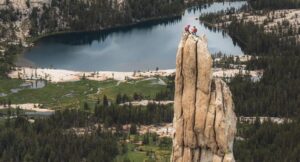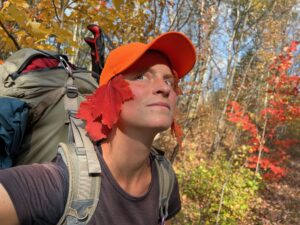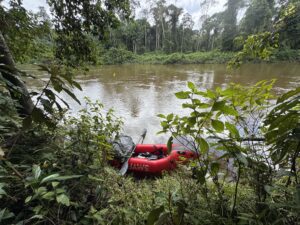Jonas Deichmann started his round-the-world triathlon in September 2020. He swam 456km in 54 days along the coast of Croatia, although he admits that he isn’t a great swimmer. “[The swim] had its good moments, but I don’t want to do it again,” he said.
Then he hopped on his bike — he’s better at that. Last week, the German athlete finished his 10,000km cycle across Russia to Vladivostok.
Overall, his self-imposed triathlon covers 40,000km. He is trying to do it with a minimal carbon footprint. Over the distance of 120 Ironmans, he will not use a support vehicle. He will hitchhike his way across any oceans on sailboats.
As usual over the 16 months for many of us, COVID restrictions threw a wrench into his travel plans. He wanted to cycle across the Balkans, through Turkey, then Russia, and China. From here, he was going to sail across the Pacific to San Francisco and begin running 5,040km across the U.S. to New York.
He duly cycled through the Balkans and a substantial way across Turkey. But when he arrived in Istanbul in mid-December, he discovered that the coronavirus had closed the border between Istanbul and Russia.

The route. Image: @jonas_deichmann
While he worked the bureaucracy to get into Russia somehow or other, Deichmann continued to train in southern Turkey. He waited 13 weeks. In the end, the German Triathlon Union, the German-Russian Forum, and the Russian Olympic Committee managed to obtain a Russian visa for him. This meant he could enter Russia through Bulgaria, Romania, Moldova, or Ukraine.
“Good luck, crazy boy!”
“Now the route to the Pacific is free of any bureaucracy and I can concentrate on riding my bike,” Deichmann said when he began pedaling to Vladivostok, the new endpoint of his cycling leg. As he cleared the Russian border, customs officials zestily sent him off with the words, “Good luck, crazy boy!”
Because of the time limit on his visa, he had to make it all the way across Russia in 60 days.
In the first week of cycling in Russia (and week 26 of the challenge), “the Russian winter makes life as a cyclist a fierce experience,” he noted. It only got harder as he crossed the Urals into Siberia. He had hoped to tackle Siberia in winter over frozen roads, but the delay forced him to travel in early spring.
It was warmer but at times impossibly muddy. Because of heavy traffic on the main roads, he had to switch to smaller unpaved byways, “which became a mud desert”. The mud got into the machinery of his bike, which made disconcerting grinding sounds as he pedaled. In every city, he took his bike to a car wash. But the next day, it was filthy again.

Day 209, Lake Baikal. Photo: @jonas_deichmann
Still, he averaged about 190km a day. “Mentally, this stretch is almost more difficult than swimming,” he said. “I ride eight hours a day and absolutely nothing happens.”
In the first few weeks, his main difficulty was the wind. At first, a tailwind nudged him along at 30km an hour. But after two days in Siberia, he faced headwinds, and his average speed plunged to 18km an hour. Once he battled through not only wind but a snowstorm and extreme cold. “Cycling across Russia in winter has been an amazing way to have an absolutely miserable time,” he said.
Food poisoning
The weather was not his only challenge. A week into Siberia, he caught food poisoning at a truck stop. “I had a delicious dish with chicken and soon realized that this was a mistake,” he said. The next morning, he felt like he was going to collapse so he spent a day recovering.
He reached Vladivostok on May 18. He is now trying to source a ride across the Pacific. From there, the next stage of his route is unclear. He was going to run across America but U.S. borders remain closed. He is now considering running 5,000km across Mexico from Tijuana to Cancun.






